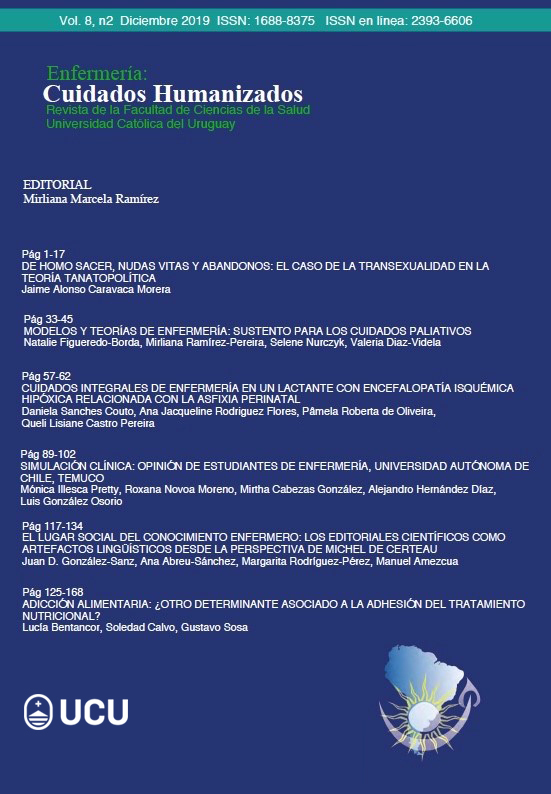ABOUT HOMO SACER, BARE LIVES AND ABANDONMENT: THE CASE OF TRANSSEXUALITY IN THANATOPOLITICS
DOI:
https://doi.org/10.22235/ech.v8i2.1843Keywords:
Transexuality, Power, Philosophy, Public Health, Nursing CareAbstract
The meaning of the postulates of Giorgio Agamben invites to discover a new sociological ontology that goes beyond the traditional definition of sovereign. Certainly, from the semantic conceptualizations of the figure of life and its relationship with the sovereign power in the current (bio-tanato) political society of normalization, we can analyze the different realities that surround us. Therefore, this study analyzes the conditions of enunciation and the existence/resistance of the person who self-identifies within the transgender spectrum, according to the thanatopolitics theory. The analogy made between the transsexual and the figure of the homo sacer, can clearly explain the reality experienced by this population. Life is included in the social and legal order only by their own exclusion, i.e. from its absolute invisibility, slaughter and extermination. Following the thanatopolitic postulates we could examine the fundamental space of abandonment, exile and violence present in all the post-colonial stories - mainly of those who are dissidents and unintelligible identities – it is necessary to understand the conditions under which it has gestated the current health policy.
Downloads
References
Agamben, G. Homo Sacer: o poder soberano e a vida nua I. Belo Horizonte: Editora da UFMG; 2007.
Agamben, G. Estado de Exceção. São Paulo: Boitempo; 2005.
Agamben, G. What is a destituent power?. Environment and Planning D. Society and Space. 2014; 32(1): 65-74.
Abdalla, C. O Estado de Exceção em Giorgio Agamben: Contribuições ao Estudo da Relação Direito e Poder. (Dissertação Mestrado em Direito) – Programa de Pós-Graduação em Direito da Universidade de São Paulo: São Paulo; 2010.
Foucault, M. The birth of biopolitics: lectures at the Collège de France, 1978-1979. New York: Palgrave Macmillan; 2008.
Foucault, M. Microfísica do poder. Rio de Janeiro: Graal (Original publicado em 1979); 2012.
Agamben, G. A Linguagem e a Morte: um seminário sobre o lugar da negatividade. Belo Horizonte: Ed. UFMG; 2006.
Agamben, G. O que resta de Auschwitz: o arquivo e a testemunha. São Paulo: Boitempo; 2008.
Patton, P. Agamben and Foucault on Biopower and Biopolitics. Giorgio Agamben: Sovereignty and life. Ed. Matthew Calarco and Steven De Caroli. Stanford, CA: Stanford University Press; 2007.
Foucault, M. Histoire de la sexualité. Tome 1: La volonté de savoir. Paris: Gallimard; 2001.
Agamben, G. Means Without Ends. Notes on Politics. Minneapolis: University of Minnesota Press; 2000.
Foucault, M. Em defesa da sociedade. São Paulo: Martins Fontes; 2009.
Agamben, Giorgio. El reino y la gloria. Para una genealogía teológica de la economía y del gobierno. Valencia: Pre-Textos; 2008.
Neal, AW. Foucault in Guantánamo: Towards an archaeology of the exception. Journal Security dialogue. 2006; 37(1):31-46.
Agamben, G. Profanations. New York: Zone Books; 2007.
Mills, C. The philosophy of Agamben. Montreal: McGill-Queen's University; 2008.
Agamben, G. Profanations. New York: Zone Books; 2007.
Agamben, G. Estado de excepción. Valencia: Pre-Textos; 2004.
Goffman, E. Estigma: notas sobre a manipulação da identidade deteriorada. Rio de Janeiro: LTC; 2011.
Butler, J. Gender trouble. Feminism and the subversion of identity. New York: Routledge,; 1990
Caravaca-Morera JA, Padilha MI. Transexualidades: os rostos do estigma e da exclusão social. Em tese. 2016; 13(1): 120-40.
Downloads
Published
How to Cite
Issue
Section
License
Copyright (c) 2019 Enfermería: Cuidados Humanizados

This work is licensed under a Creative Commons Attribution 4.0 International License.

















